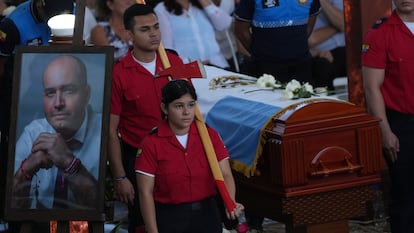Being a mayor in Ecuador can be deadly
In under a year, two mayors and four councilors have been killed, while another 30 local officials faced threats and assassination attempts

Mayor Galo Meza works with a small staff in a modest office in Balzar, a small city on the Ecuadorian coast, the most violent part of the country. He has no bulletproof vest, no helmet, no bodyguards. “I just trust in God to keep me and my family safe,” said the mayor who survived a recent attack on his home. “There are 65 bullet holes in my home.” Around midnight, his wife and youngest son were asleep in rooms with windows facing the street that the bullets shattered. Thankfully, everyone was unharmed. “My wife fears they’ll come back and doesn’t want to sleep there anymore.” Meza says he doesn’t know why he was attacked or who would want to harm him, and asked for police protection the very next day. But these things don’t happen fast in Ecuador, so Meza is still waiting for the police’s risk assessment, guarded by a lone patrolman.
There are 150 local officials waiting for police protection according to the Association of Ecuadorian Municipalities (AME), which has urged the government to conduct a risk analysis for all of the country’s 221 mayors. However, progress is slow, with only 30 mayors currently under police protection. “We don’t have the resources to address all the protection requests we receive,” said Interior Minister Mónica Palencia. “We even get requests for bulletproof cars, so we understand what these officials are facing.”
Palencia made those statements shortly after the attack on Meza’s family and murder of San Vicente Mayor Brigitte García, a coastal city in Manabí province. García was found shot three times in a rented vehicle while on a trip. She was the second Manabí mayor murdered in less than a year. In a similar incident, Manta Mayor Agustín Intriago was shot and killed in July 2023. Justice was served eight months later when six people were sentenced to 34 years in prison for the murder. But the person who ordered the killing has not been identified.
Ecuador has 221 population-based municipalities governed by a mayor and a municipal council. The currently serving officials took office in May 2023 following the most violent elections the country has ever seen. Organized crime groups have targeted these local officials — in under a year, two mayors and four councilors have been killed, while another 30 local officials faced threats and assassination attempts.
City governments have the authority to oversee agencies and functions that can facilitate drug trafficking, like granting business permits and awarding contracts for public projects that could be used by traffickers to launder money. They also supervise transportation agencies that handle significant sums and control roads crucial for drug trafficking routes. “As public policy builders in our municipalities, we operate in a unique space compared to regular citizens because our decision-making involves risks,” said AME president Patricio Maldonado.
Amid a backdrop of violence and vulnerability, being a mayor in Ecuador has become a dangerous job. “I feel like I’m in danger every day,” said Ligia Caiza, mayor of Carlos Julio Arosemena Tola, an Amazonian city of 4,700 with a $300,000 monthly budget. That’s all she has to provide basic services, health care, education, pay salaries and buy fuel for the single vehicle that three police officers share to patrol the municipality. “We need more police, better security at the border near here, and security cameras that are operational and linked to the national surveillance system,” Caiza said.
Security is the central government’s responsibility, but it has faltered due to the lack of a clear strategy and timely budget allocations. “As mayors, we feel threatened. We truly believe that we can help our country, but sadly, they’re killing us,” Maldonado said. The mayors cannot address the public safety crisis because they also lack resources. “The central government owes the municipalities a hefty $1.3 billion for nearly three months of budget allocations.” AME organized a peaceful march on April 10 to protest the persistent funding delays since 2023, which has led to a crisis in supplier payments, unpaid salaries and work stoppages. President Daniel Noboa immediately criticized the move as political opportunism, and accused the municipal officials of being left-wing activists for former President Guillermo Lasso’s party. “They aim to use the union as a shield to attack us and the new Ecuador we are building. We are slowly gaining ground in our efforts to rebuild, which will expose certain politicians,” said Noboa who never acknowledged that being a mayor in Ecuador has become a very risky occupation.
Sign up for our weekly newsletter to get more English-language news coverage from EL PAÍS USA Edition
Tu suscripción se está usando en otro dispositivo
¿Quieres añadir otro usuario a tu suscripción?
Si continúas leyendo en este dispositivo, no se podrá leer en el otro.
FlechaTu suscripción se está usando en otro dispositivo y solo puedes acceder a EL PAÍS desde un dispositivo a la vez.
Si quieres compartir tu cuenta, cambia tu suscripción a la modalidad Premium, así podrás añadir otro usuario. Cada uno accederá con su propia cuenta de email, lo que os permitirá personalizar vuestra experiencia en EL PAÍS.
¿Tienes una suscripción de empresa? Accede aquí para contratar más cuentas.
En el caso de no saber quién está usando tu cuenta, te recomendamos cambiar tu contraseña aquí.
Si decides continuar compartiendo tu cuenta, este mensaje se mostrará en tu dispositivo y en el de la otra persona que está usando tu cuenta de forma indefinida, afectando a tu experiencia de lectura. Puedes consultar aquí los términos y condiciones de la suscripción digital.








































